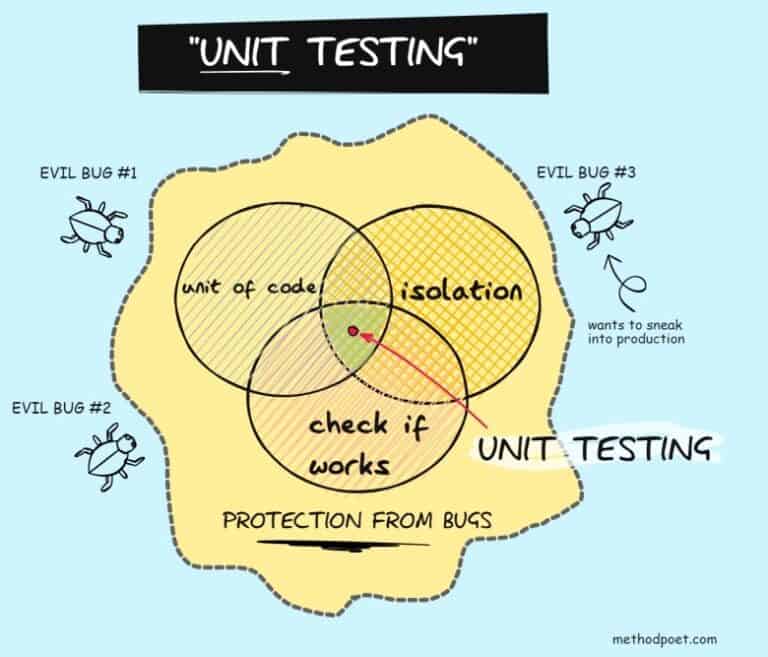If you are interested in software development, you will know the importance of unit testing. Unit testing is a way to test small bits of pieces of code rather than whole applications.
Unit testing in DevOps has a simple goal: to make the software development process faster and more efficient. In addition, unit testing in DevOps is critical if you are working with other developers because it gives you confidence that the latest code changes won’t break the old features.
Unit testing is easy and affordable, so you can focus on what matters most – building great products. This article focuses on the main principles of unit testing in DevOps, including why it is essential and how to start.
What is unit testing?
Unit testing is a software testing process through which you validate the smallest parts of the code. It’s an automated testing approach that allows for fast and efficient testing.
Developers can run unit tests as often as possible and on their schedule. In addition, unit tests provide a way to monitor changes and identify regressions before checking in code.
The main goal behind writing unit test cases is to eliminate bugs and errors from the software, making it more stable and secure. In addition, unit testing ensures that the code is reliable enough for further integration with other components.
When you have unit tests, you can identify bugs in the code, which can be difficult to detect during manual testing.
The importance of unit testing

Unit testing is one of the most overlooked aspects of writing code, even though it is the most important.
When you write code without unit tests, you are assuming that your code works correctly. Unfortunately, that is an assumption that will haunt you every time you make a change or fix a bug. When your code is not well-tested, you will have to debug more often. Debugging takes time, and businesses must save time at all costs.
If your company is trying to develop software quickly, you should implement unit testing in your development process.
What is DevOps?

DevOps is a software development practice whose goal is to unify software developers and system administrators. DevOps is an iterative approach that delivers better collaboration, more efficiency, and increased productivity.
You can use DevOps to address the shortcomings of traditional software development practices, which tend to be time-consuming and cost-inefficient. It relies on automation to reduce the amount of work required to deliver frequent updates. It also allows teams to build, test, and deploy code quickly, using continuous integration and continuous delivery.
What are the benefits of DevOps?
There are several benefits of DevOps.
- It makes the delivery cycle quicker.
- Developers and operations engineers can work closely together, which helps to reduce the time required to deliver new features.
- It drives down costs. DevOps is more cost-effective than traditional approaches to application development.
- It provides better quality of service. The increase in communication between developers and operations engineers decreases the likelihood of deployment errors.
The goal of DevOps is to reduce the time it takes to bring new software applications into production while maintaining quality.
The DevOps approach has grown in popularity because it offers key advantages, including increased productivity, reduced costs, improved reliability, and better use of data.
How to start with DevOps?
DevOps is not a single tool or product. Instead, it’s a culture shift that requires shifting focus from individuals to collaboration across an organization. However, before you can begin using DevOps principles, you need to have a foundation in place.
The following are the top five things that DevOps requires to be successful:
- Automate as many tasks as possible.
- Build a culture of trust and respect.
- Eliminate bottlenecks and delays.
- Integrate software development and operations.
- Measure constantly and improve often.
One of the critical tasks to automate is the unit tests execution.
How to start with DevOps
DevOps and CI/CD have radically improved the development process. Now, teams can develop with a high degree of confidence that the code they release will do what it’s supposed to do.
But the question is, how do you get started with the DevOps process? Well, you will certainly need a tool to automate various stages of your development process.
Today, several tools are available that make the process of unit testing for DevOps easy enough to be done by your existing team. The only thing you need is to understand how to use them and best practices.
So let’s see what they are:
- Azure DevOps – Microsoft Azure DevOps service is a set of features that combine the continuous integration and deployment (CI/CD) capabilities of Azure Pipelines with the source code management power of GitHub. Azure DevOps Pipeline is a cloud-hosted CI/CD solution that helps the DevOps team to build, test, and deploy apps in any language on any platform.
- Jenkins – Jenkins is an open-source automation server with continuous integration and continuous delivery features. It is available as a free software download.
- AWS DevOps – Amazon Web Services (AWS) provides on-demand cloud computing platforms to individuals and companies on a paid subscription basis. AWS DevOps provides the tools required for setting up continuous delivery pipelines, integrating with other AWS services, configuring tools for continuous integration, deploying to different environments, monitoring the application’s performance and uptime.
These are just some of the most popular DevOps tools.
Benefits of Unit Testing in DevOps
Automated testing is the cornerstone of DevOps. Testing not only ensures that your product works, but it can also ensure that all of your developers are on the same page with best practices – a vital component of the DevOps methodology.
Unit testing is an essential component of continuous testing, continuous integration, continuous delivery, and DevOps. It functions as the first line of defense against bugs. Error-prone code will most likely break the unit test, making it easy to identify and fix errors before making it into production.
Automated unit testing is also vital because it helps create a fast feedback loop. The feedback loop with CI/CD systems is such that with each new code push, the system runs the test suite, and then the test result is returned to the developer. This loop can help identify and fix errors by running different types of tests:
- unit testing
- integration testing
- security testing
- UI testing
- API testing
To achieve maximum results from your DevOps testing strategy should contain more than one of the above types of automated testing.
But unit testing can be more than just a way to automate regression testing. Unit tests also help you to write better code from the start. For example, you can write automated tests for new features before you begin with development. This is known as test-driven development.
Conclusion
Unit testing is the most fundamental part of DevOps, allowing for fast development cycles and continuous deployment. Not only does it allow for faster development cycles and continuous deployment, but it also improves the overall quality of each release.
Unit testing in DevOps should be a top priority for any business interested in improving its development process.
